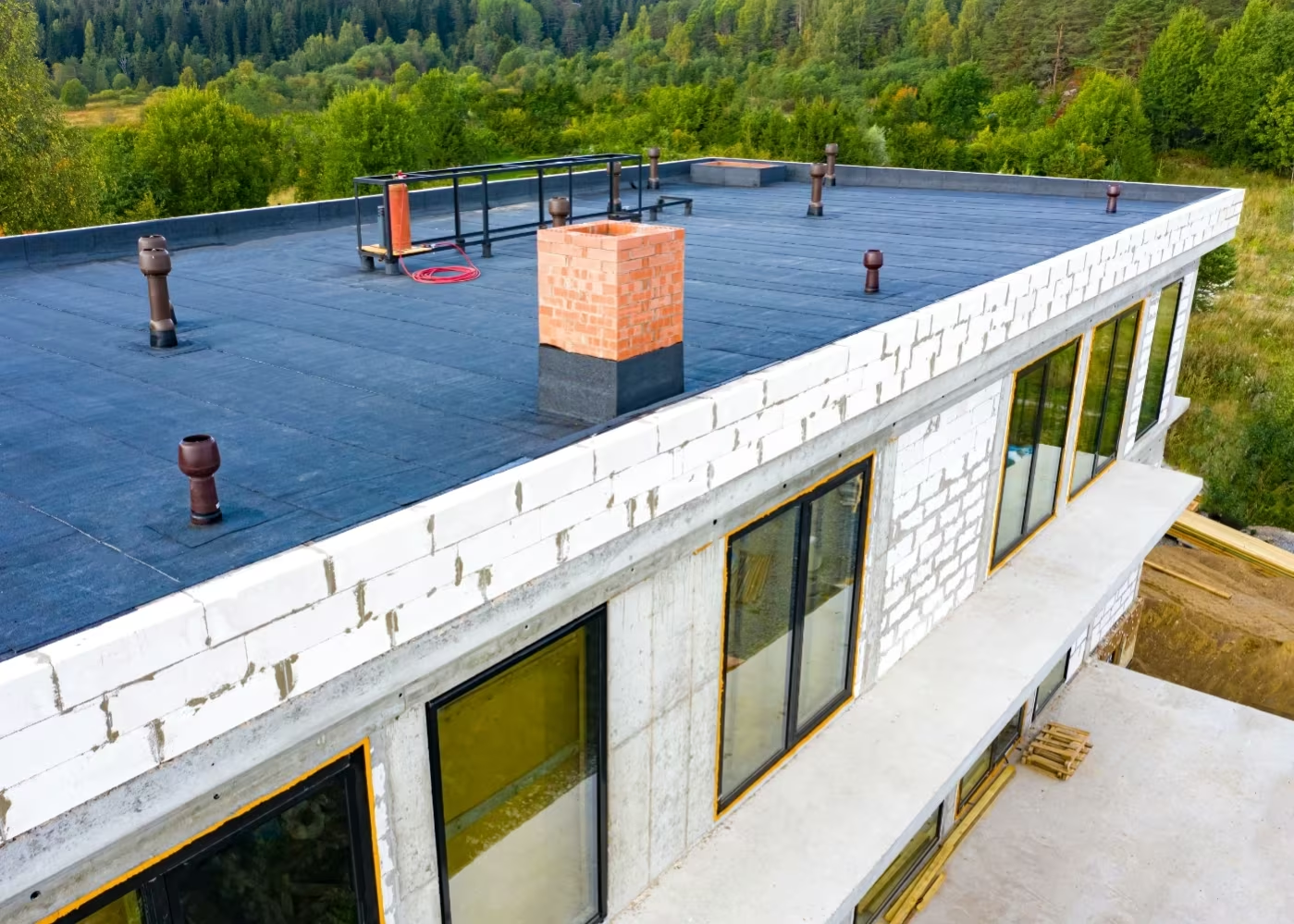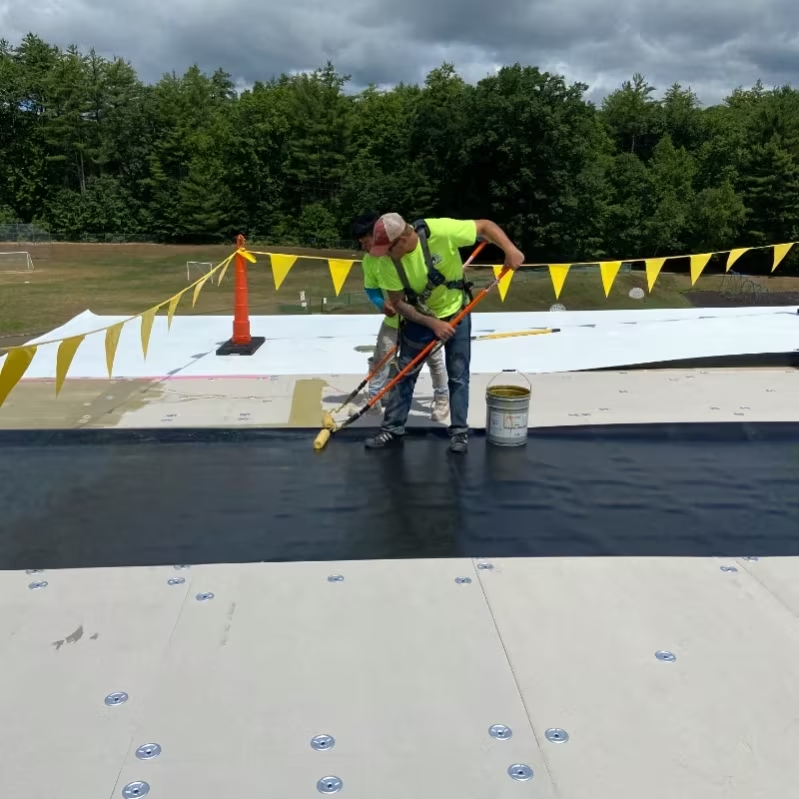Commercial roofer Boston
Discover unparalleled expertise with KTM Roofing & Exteriors, Boston's top Commercial Roofing Contractor for commercial roofing excellence. Our dedicated team sets the standard in quality and reliability, ensuring your roofing needs are met with unmatched professionalism.
Get a free estimate


Commercial roofing in our unique climate
In Boston, where the climate ranges from blistering summers to harsh, snowy winters, commercial roofing requires a strategic approach. KTM Roofing & Exteriors, a leading commercial roofing company, understands this dynamic well. Our team specializes in selecting and installing roofing materials for flat roofs such as rubber EPDM (Ethylene Propylene Diene Terpolymer), TPO (Thermoplastic Polyolefin) (TPO) and PVC (Polyvinyl Chloride) that stand up to Boston's unique weather conditions, ensuring longevity and durability. We consider factors like thermal expansion, moisture resistance, and Roof Drainage, tailoring our commercial roofing solutions to meet the specific challenges posed by Boston's climate. With KTM, your commercial roofing isn't just a structure; it's a weather-resistant investment.

Benefits of KTM Roofing & Exteriors professional roofing services
Choosing KTM Roofing & Exteriors means opting for a blend of quality, expertise, and customer-focused service in the commercial Boston roofing industry. We pride ourselves on using only the highest quality materials for flat roofing and emergency roof repairs, ensuring that your commercial roofing is not just durable, but also aesthetically pleasing. Our team of certified Commercial Roofers is committed to delivering excellence, from initial consultation to the final installation of your commercial roofing project. At KTM, customer satisfaction is paramount, and we go above and beyond to ensure your roofing experience is seamless and stress-free. With KTM, you're not just getting a service, you're gaining a reliable roofing partner. KTM is backed by some of the leading manufacturers in the industry and is able to offer extended warranties offering both material and labor coverage direct from the manufacturer!
Recognizing the right time for commercial roofing services
Knowing when to seek professional roofing services is crucial for maintaining the integrity of your commercial building. At KTM Roofing & Exteriors, we guide you in spotting key signs of wear, such as water stains, blistering paint, or damaged flashing, that signal the need for expert Commercial Roof Repair. Adhering to industry best practices, our team advises regular Roof Maintenance, especially after extreme weather events, to ensure any issues are caught early. Trust KTM’s expertise to extend the lifespan of your roof, safeguarding your investment and maintaining your building’s safety.
Some of our commercial services include:

Commercial roof repair
Boston commercial roof repair
Commercial roof repair Boston
Commercial roof painting
Commercial roof installation
Commercial roof replacement
Commercial roof painting Boston
Commercial roof installation Boston
Commercial roof replacement Boston
Boston commercial roof painting
Boston commercial roof installation
Boston commercial roof replacement
Commercial roof maintenance
Commercial roof maintenance Boston
Boston commercial roof maintenance


KTM Roofing & Exteriors: Your premier commercial roofing expert
As Boston’s premier commercial roofing expert, KTM Roofing & Exteriors brings a legacy of quality commercial roofing and excellence to every project. Our team’s extensive experience in Commercial Roof Installation, backed by numerous successful projects, positions us at the forefront of the industry. We take pride in our high customer satisfaction rates, a testament to our commitment to excellence. Clients trust KTM for our certified professionals who ensure each project meets the highest standards. Choose KTM Roofing & Exteriors, where expertise meets quality, for all your commercial roofing needs.
Latest roofing materials and technologies for your business
At KTM Roofing & Exteriors, we stay at the forefront of roofing innovation, incorporating the latest materials and technologies into our services. Our selection includes advanced solutions like energy-efficient membranes and shingles and durable eco-friendly materials, all aimed at enhancing the longevity and performance of your shingled roof or flat roof. We constantly adapt to the evolving market, offering your business roofing options that are not just current but future-ready, ensuring your investment in a commercial roofing project is sound for years to come.
Our commitment to quality and safety in roofing
Quality and safety are the cornerstones of our work at KTM Roofing & Exteriors. Our team adheres to rigorous safety standards in every commercial roofing project, ensuring each project is executed with utmost precision and care. We use only top-grade materials for roof replacement and maintenance, coupled with a workforce skilled in the latest roofing techniques. This commitment to excellence guarantees that every roofing project we undertake is not just aesthetically pleasing but also structurally sound and reliable.
Our commercial services include:
- Fascia board
- Siding
- Soffit
- Flashing
- Deck
- Shingle
- Flat
- Gutter cleaning
- Snow removal
- Rolled
- Asphalt
- Rubber
- TPO
- EPDM
- PVC
Contact KTM Roofing & Exteriors for your commercial roofing needs
Ready to elevate your commercial roofing experience in Boston? Connect with KTM Roofing & Exteriors today for quality commercial roofing services! Our team is eager to discuss your specific needs, offering a wide range of commercial roofing solutions including roof maintenance, repair, and installation. With our commitment to customer support and easy communication, we make every step of the process seamless and stress-free. Reach out to us for a consultation, and let's start a partnership that transforms your commercial roofing visions into reality. Your journey to excellence begins with a simple call to KTM Roofing & Exteriors.



Hear from our happy customers
Linda Weatherbee
Charles Pouliot
Robert Fortunato
Raymond Madore
Contact us
Contact us today and take the first step towards enhancing your home or business in Boston, or surrounding areas!